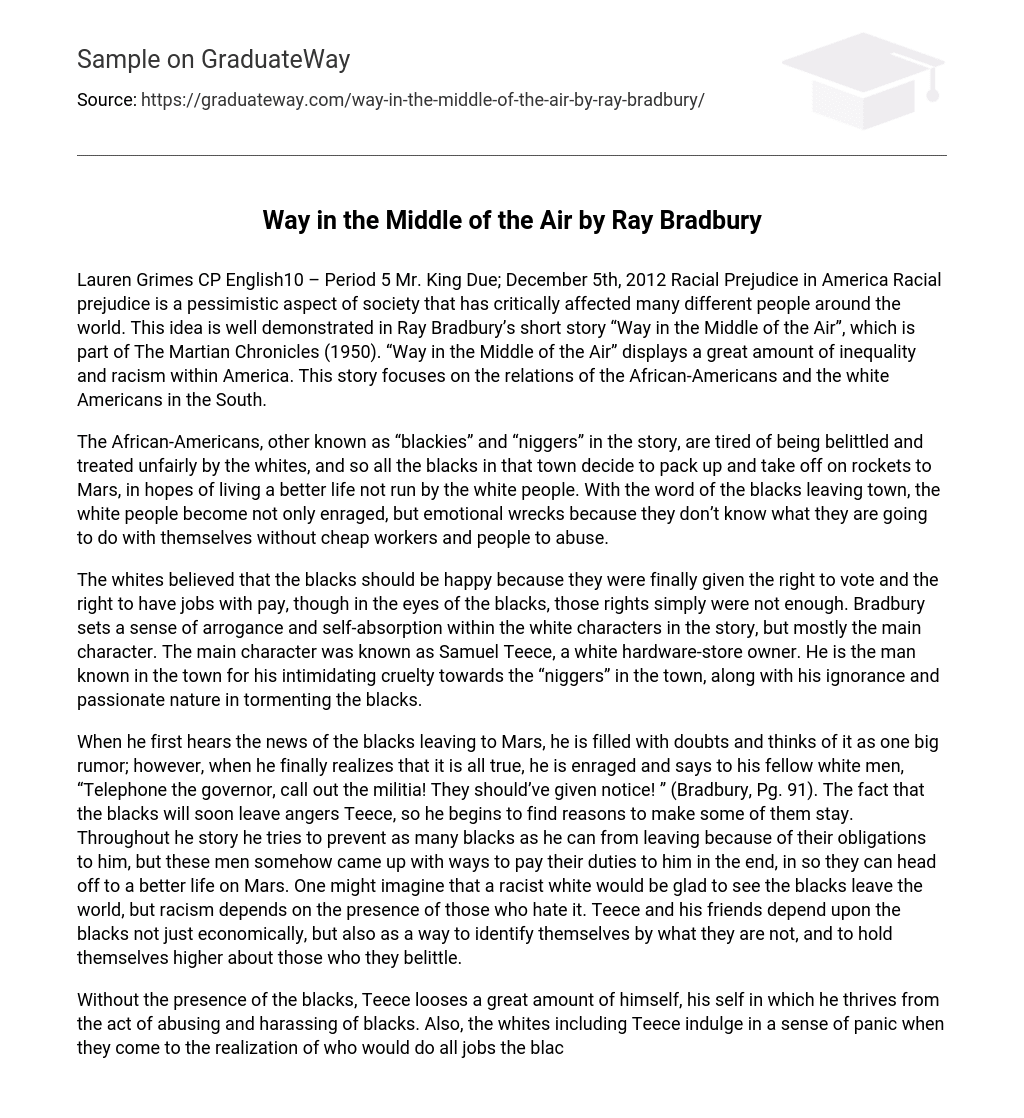Racial prejudice is a pessimistic aspect of society that has critically affected many different people around the world. This idea is well demonstrated in Ray Bradbury’s short story “Way in the Middle of the Air”, which is part of The Martian Chronicles (1950). “Way in the Middle of the Air” displays a great amount of inequality and racism within America. This story focuses on the relations of the African-Americans and the white Americans in the South.
The African-Americans, other known as “blackies” and “niggers” in the story, are tired of being belittled and treated unfairly by the whites, and so all the blacks in that town decide to pack up and take off on rockets to Mars, in hopes of living a better life not run by the white people. With the word of the blacks leaving town, the white people become not only enraged, but emotional wrecks because they don’t know what they are going to do with themselves without cheap workers and people to abuse.
The whites believed that the blacks should be happy because they were finally given the right to vote and the right to have jobs with pay, though in the eyes of the blacks, those rights simply were not enough. Bradbury sets a sense of arrogance and self-absorption within the white characters in the story, but mostly the main character. The main character was known as Samuel Teece, a white hardware-store owner. He is the man known in the town for his intimidating cruelty towards the “niggers” in the town, along with his ignorance and passionate nature in tormenting the blacks.
When he first hears the news of the blacks leaving to Mars, he is filled with doubts and thinks of it as one big rumor; however, when he finally realizes that it is all true, he is enraged and says to his fellow white men, “Telephone the governor, call out the militia! They should’ve given notice! ” (Bradbury, Pg. 91).
The fact that the blacks will soon leave angers Teece, so he begins to find reasons to make some of them stay. Throughout he story he tries to prevent as many blacks as he can from leaving because of their obligations to him, but these men somehow came up with ways to pay their duties to him in the end, in so they can head off to a better life on Mars. One might imagine that a racist white would be glad to see the blacks leave the world, but racism depends on the presence of those who hate it. Teece and his friends depend upon the blacks not just economically, but also as a way to identify themselves by what they are not, and to hold themselves higher about those who they belittle.
Without the presence of the blacks, Teece looses a great amount of himself, his self in which he thrives from the act of abusing and harassing of blacks. Also, the whites including Teece indulge in a sense of panic when they come to the realization of who would do all jobs the blacks had. This shows the importance of blacks in the lives of the whites. Anger and revengefulness awakens within Teece when his former black employee, Silly, drives away in the distance and screams back at him, “Mr. Teece, Mr. Teece, what are you goin’ to do nights from now on? What are you goin’ to do nights, Mr. Teece? (Bradbury, Pg. 99).
At first Teece did not know what Silly meant by that, but then he realized he was referring back to when he would go out with his friends and lynch “niggers”, for fun and excitement. He has relied on blacks to be there not just to work for him, but to be his victims. This not only infuriated Teece, but forced him to chase after Silly with his shotgun and open top car. After a long chase that never caught up to Silly, Teece decided there was no use and to just go back to his shop, where he would disregard the sound of his victims taking off and living a life with no Samuel Teece.
In conclusion, Bradbury proves that the blacks played prominent roles in the lives of the whites. Bradbury revealed that the blacks were not only victims and workers of the whites, but what made the whites who they were. The blacks gave the whites a sense of power and ownership. The blacks were who the whites can always belittle, who they can look at to make them feel better about themselves and where they stand in society. Without the blacks, whites back then would simply be completely different people. A world without blacks and the history of racism would be a world unlike the one today.





